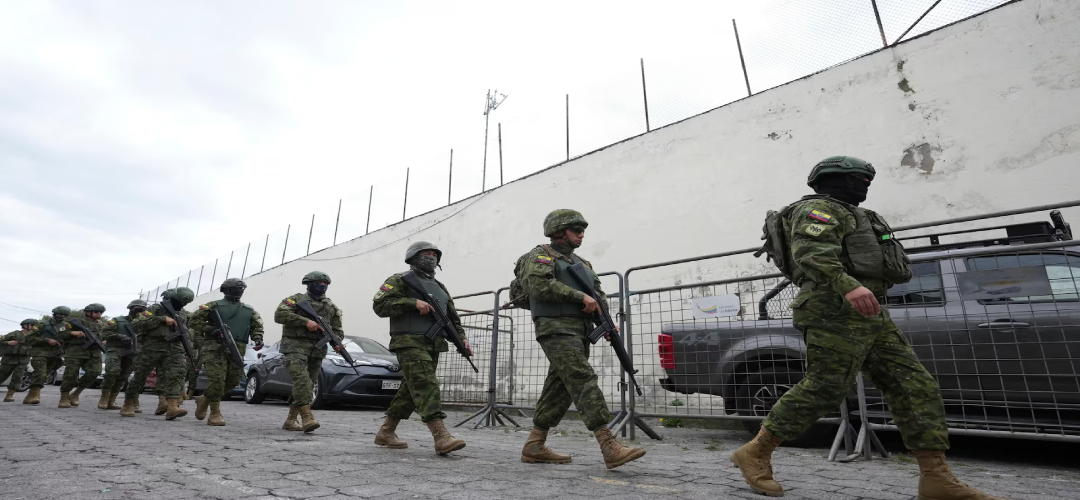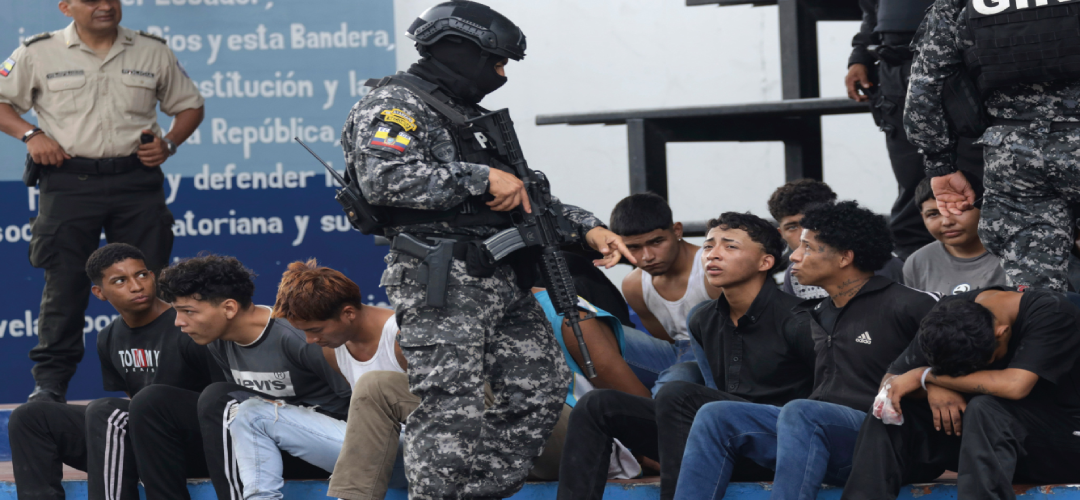Gangs of Ecuador
January 20, 2024 | Expert Insights

The criminal gangs now overrunning the erstwhile peaceful country of Ecuador could not have chosen a better method of sending a powerful message of the impunity they apparently enjoy in this impoverished, beleaguered nation, poised to overtake Colombia as the hub of drug traffic into the U.S. and Europe.
On January 9th, masked gunmen armed with automatic weapons and explosives stormed into a TV station during a live broadcast, taking hostages and shooting anchors, injuring several. That there was no other purpose to this apparent madness than signalling to the authorities became clear when the 13-armed intruders later surrendered to the police without putting up any armed resistance. The message was not to mess with the drug gangs!
The message was clearly designed for the newly elected president, at 36, the youngest president the country has seen and the scion of a rich business family, Daniel Noboa. Putting up a brave front, Noboa proscribed 22 gangs as terrorist organisations and ordered the military to hunt them down, a task that the small, ill-equipped Army may find daunting.
The gangs have responded in their characteristic violent ways- engineering mass prison breaks, taking hundreds of prison guards as hostages, and targeting police officers and even hospitals and police stations. The TV station in the besieged town of Guayaquil, the most dangerous city, was the one that grabbed international eyeballs.
Background
Only five years ago, Ecuador was considered amongst the safest countries in the region; today, violence has completely overwhelmed its rule of law.
This South American nation is facing an existential crisis, with a 60-day overnight curfew placed as the armed forces screen the streets for the ‘terrorist’ groups and their leaders who escaped prison. José Adolfo Macías Villamar, alias name “Fito”, is the leader of the infamous Los Choneros gang in Ecuador. He had been imprisoned since 2011, serving a 34-year sentence with charges of organised crime, murder and drug trafficking. On 7 January 2024, he escaped from an overcrowded prison in the coastal city of Guayaquil. The next day, the TV station was stormed.
Before Fito’s second escape, an order was issued to transfer highly conspicuous criminals to a maximum-security facility. Clearly, the government’s intention about the transfer was leaked. Fito had escaped prison in 2013 before he was the gang leader.
Ecuador faces a national-level security threat as 2023 goes into record books as the most violent year in its history in 2023, with 7,592 violent deaths. It is unclear whether the jailbreaks and uprisings were orchestrated by the Los Choneros gang alone, as another gang leader, Fabricio Colón of the Los Lobos gang (alias name "El Salvaje"), imprisoned earlier that week, managed to escape during the same incident. Evidently, gangs are in total control of the country’s prison system, just like Colombia.
As troops marched out on the streets, Rear Admiral Jaime Vela, the armed forces commander, reassured the Ecuadorian public with information that they had detained 329 members across the Los Choneros, Los Lobos and Los Tiguerones gangs.

Analysis
The seriousness of the situation can be gauged from the fact that China hurriedly brought the shutters down on its embassy, and Washington immediately reacted with a generous weapon aid worth $ 200 million.
President Noboa’s main challenge will be creating lasting change beyond the immediate military-led pacification tactics. Such measures are unsustainable in the broader spectrum of civilian welfare and economic stability, and there will be the inevitable cost of human rights violations that all such military-led peace enforcement operations entail.
The security crisis points to two simultaneous wars - criminals versus criminals versus the government. Colón (Lobos) has openly stated that he has a target on Attorney General Diana Salazar, prosecutor of some of the most high-profile criminal cases in Ecuador, and President Noboa. On 9 August 2023, Fernando Villavicencio, former Presidential candidate and an avid investigative journalist, was assassinated as he left a campaign event. A week before his assassination, he revealed he had received threats from the Los Choneros gang. Fito was transported to the 150-person La Roca prison that month, which involved thousands of armed forces.
It is also clear that the Los Choneros and Los Lobos gangs are warring with each other. Fito is more infamously known within the community, especially for his ties in Mexico over controlled drug trade routes.
Renato Rivera of the Ecuadorian Observatory on Organised Crime explains that Ecuador’s globalised economy, but poor security structures are the reasons it has become a hub for cocaine trafficking globally. Its borders with Peru and Colombia make it the most favourable drug-shipment point.
While the fight was one over traffic routes and prison control, the focus has shifted to power, politics, influence and image, meaning the capacity to challenge the government. The politicisation of criminal groups and the spread of propaganda through news and “narcocorridos” (a subgenre of Mexican ballads used as a form of drug cartel journalism) contribute to the added pressure for the government to tread the murky waters carefully.
Having convicted cartel leaders control their rings from within jail defeats the point of imprisonment. Even though the nation is under strict vigilance, an anthropologist who studied the Ecuadoran prison system for years said President Noboa is not doing anything particularly different to change prison security standards. The previous government gave prison control over to the police, who enabled cartel jurisdiction from the inside, as well as providing extended privileges to imprisoned cartel leaders. YouTube videos also show Fito’s cell having four power outlets, more than an average hotel room.
The country is at an economic and social standstill because of terror, and the points of blame are innumerable, so much so that civilians compare the present situation to the COVID-19 environment. The country cannot carry on with civilians having chronic fear of the police or mafia raiding homes or businesses, be it for checking or violence. The lines, blurred by the indefinite threat to their lives and livelihood, make the situation more of a foreshadowing scenery of the conflicts still yet to come.
Assessment
- President Daniel Noboa seems resolved to take control of the situation with sophisticated prison plans and security structures. But judging by precedents and the country’s political trajectory, any improvement would be difficult to achieve.
- Stabilising the country would require a truce within the mafia war and a peaceful resolution between the government and the gang leaders. The alternative would be radical change by the Ecuador government and undoing it as a drug-trafficking hotspot, which is only possible if consumers stop demanding drugs altogether - something unforeseeable in the near future.
- This is a forewarning to many smaller nations with a weak security / law enforcement structure deeply seeped in corruption. We saw the same thing happening in Haiti recently and a helpless international community stood on the side-lines wringing its hands. As demand for drugs grows, more countries, especially in South America, could be in a similar predicament.








Comments